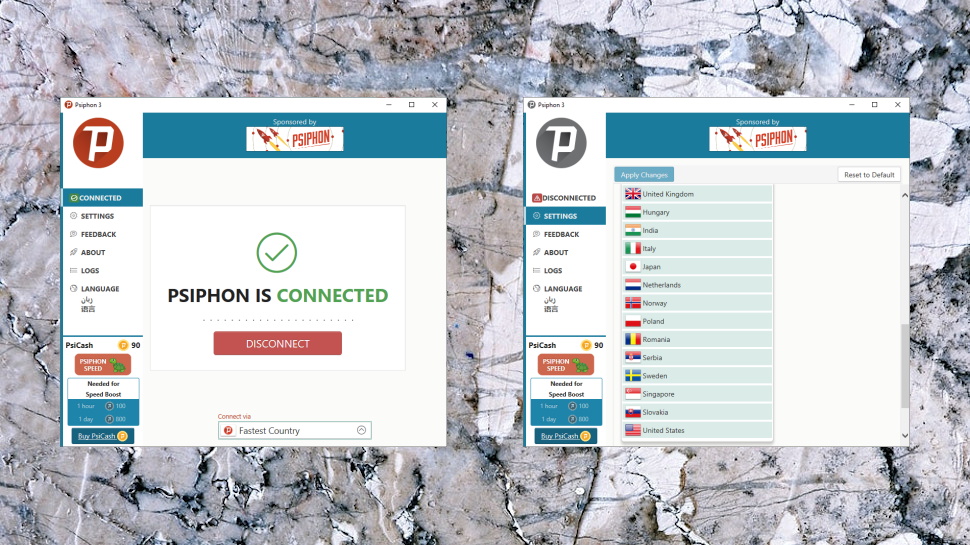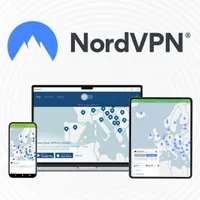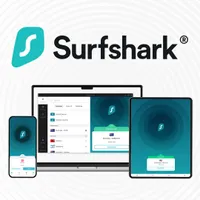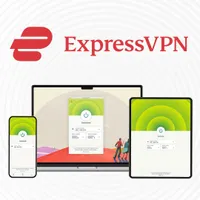TechRadar Verdict
Psiphon is free to use, doesn't impose a data allowance, and works like a charm when it comes to side-stepping oppressive digital censorship. Still, it's let down by a limited server network and a stale UI, as well as some seriously sluggish speeds.
Pros
- +
Completely free with unlimited data usage
- +
Effective at bypassing internet censorship in restrictive countries
- +
No account registration required for basic use
- +
Multiple independent security audits conducted
Cons
- -
Severe speed limitations (2 Mbps on free plan)
- -
Logs user metadata and connection information
- -
No kill switch protection on any platform
- -
DNS leaks
- -
Very limited server network (21 countries)
- -
Outdated and clunky user interface
Why you can trust TechRadar
Psiphon is not a traditional VPN – it’s a censorship circumvention tool developed by the University of Toronto's Citizen Lab. Created in 2006 to help citizens access blocked content in restrictive countries, Psiphon has gained plenty of traction among activists in censored regions like Myanmar, Iran, and China.
The service is completely free with unlimited data, but comes with a paid upgrade to access high-speed servers. We’ve found several use cases where Psiphon would be pretty handy, but it comes with some extensive caveats if you’re expecting the features you’d get from one of the best VPNs on the market.
Read on, and we’ll get into the instances where we would recommend Psiphon, and why we’d mostly recommend you look elsewhere.
We’ve taken Psiphon for another round of speed testing to see how it holds up with SpeedBoost enabled, but the results weren’t particularly thrilling. Other than that, we’ve updated the review to bring the most important features of this VPN to the forefront.
Features
First up, we should point out that Psiphon doesn’t work like a VPN by default. Instead, Psiphon offers a unique hybrid approach combining VPN, SSH, and proxy technologies into a single circumvention tool.
It has two distinct modes: a proxy mode for basic web browsing and a VPN mode that tunnels all device traffic. When you boot up Psiphon, any app that runs through a SOCKS proxy is automatically configured to run traffic through the Psiphon servers. This mode is designed to access blocked sites, but it won’t disguise your browsing traffic. Anyone monitoring your network will be able to see the data you’re sending from your device.
On top of the default SSH tunnel used to power the proxy mode, you also have the option for “SSH+,” which automatically switches between different connection methods (SSH, HTTP, HTTPS) to maintain access when your proxy tunnel is blocked.
It’s an obfuscation technique that sends your traffic with an extra protocol built on top, essentially disguising your connection to the proxy as communication with a normal web server. There’s also a form of automatic multi-hop built in under the hood, which automatically routes your traffic through the best tunnels on the way to the endpoint you specify. This makes it particularly effective at bypassing the Great Firewall of China and other sophisticated censorship systems.
Split tunneling is available in a limited form. You can choose not to proxy local sites, but that’s about it. There’s no way to customise which apps use Psiphon and which don’t, as well as no way to specify individual websites you want the VPN to ignore.
The Android version includes a "MalAware" feature that detects certain types of malware in data traffic by comparing your requests against known IPs and domains that serve malware. It gives you a pretty specific readout of what threats you’re possibly being served with, although it’s not a full anti-virus solution. MalAware can only warn you; it can’t remove malware from your device.
If you’re unhappy with your current speeds, Psiphon uses a virtual currency system called "PsiCash" that you can either earn by watching advertisements or purchase to temporarily boost connection speeds.
Features score: 6/10
Server network
Psiphon operates a modest network of servers across just 28 countries, with the vast majority concentrated in Europe. There are just two servers available for North America and three in Asia.
If you want to connect to Africa, the Middle East, or Oceania, you’re out of luck. All of the servers are also country-level, so you won’t be able to switch if the server you’re connected to isn’t giving you the performance you want.
We suspect Psiphon operates several thousand servers, but it’s unclear what the exact number is. Given their relatively small global presence and slow speed results, we have to assume most of these are pretty outdated.
Server network score: 3/10
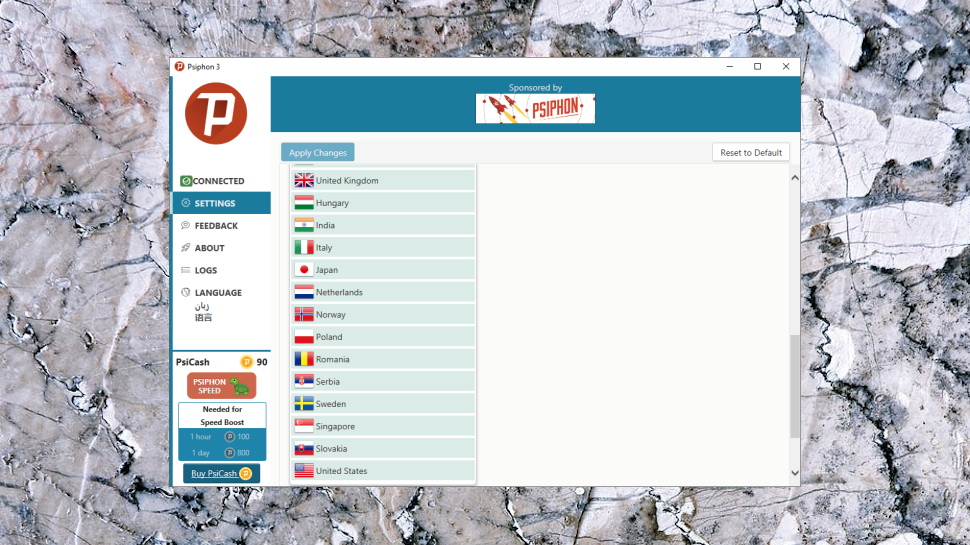
Apps
Psiphon provides applications for Windows, macOS, iOS, and Android. Although there are some methods available to run Psiphon as a Linux VPN, none of these are official. You’ll have to download a third-party solution instead that modifies the core Psiphon files, so go ahead at your own risk.
Design-wise, the Windows application features some particularly dated interface choices, which make it reminiscent of software from the early 2000s. It’s not pretty by any means, but it’s functional enough.
The options are clearly laid out from the dashboard, but the PsiCash menu is presented to you twice on the main page. However, once you get to the settings menu, the actual settings are buried within sub-menus that aren't clearly labeled, which makes it pretty complex if you aren’t already familiar with general networking concepts.
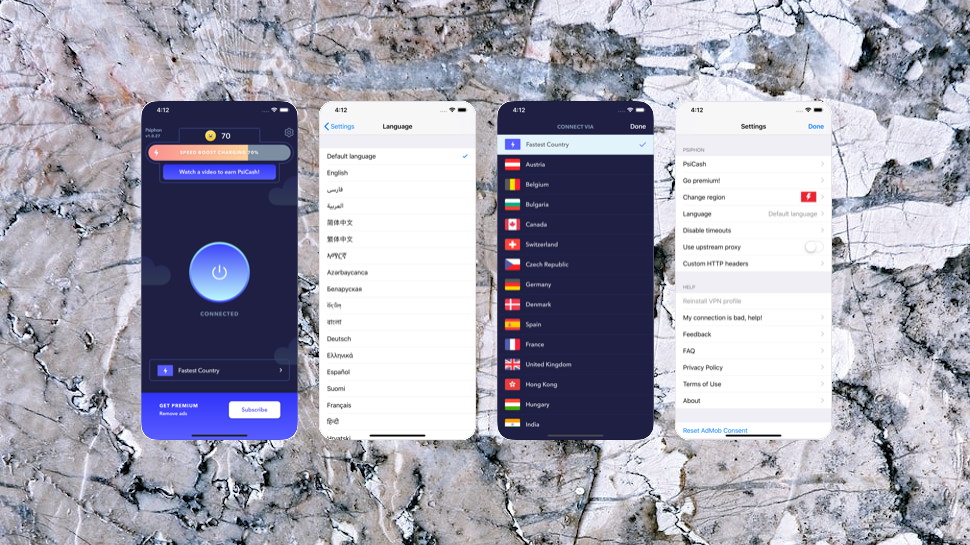
,The mobile applications offer a somewhat more modern design but are also pretty clunky and unintuitive. On Android, you get additional features like the MalAware detection system and device-wide tunneling options. However, the iOS version is more restricted, making it the weakest version of Psiphon.
Installation is straightforward across all platforms and no account registration is required to use the basic service. However, if you want to purchase speed boosts, you must provide payment information and an email address.
Ultimately, all versions of Psiphon suffer from the same fundamental limitations: the absence of essential VPN features like kill switches, DNS leak protection, and reliable connection stability.
Apps score: 5/10
Ease of use
Psiphon is relatively easy to set up and use as long as you’re not installing it on Linux. You won’t need to provide any details to get the basic version of Psiphon up and running, so all you have to do is download and run an executable on Windows. That makes it highly portable if you need a VPN you can deploy in any situation.
On Android and iOS, you’ll need to install it from the Play or Apple store, but other than that, the process remains the same. All in all, it's a pretty decent VPN for beginners.
However, the automatic browser launching feature is pretty annoying, and there’s no option to turn it off. Worse, if you haven’t got a SpeedBoost enabled, it actually serves you ads from Psiphon’s partners. If you’re concerned about being tracked by advertising agencies, this is the worst tool you could use.
It’s also hard to find the server you want to connect to, as they’re not listed in alphabetical order. You’ll have to scroll through a list of random servers to find the correct one, which is just an unnecessary issue that seems fairly easy to fix.
Ease of use score: 5/10
Speed and performance
We recognise that Psiphon's a free service that’s being run with a very specific use case in mind: getting around content blocks for web content. However, the performance speeds we recorded on Psiphon’s free version were nigh unusable.
It shouldn’t be a surprise, as the free version is limited to just 2 Mbps, and these speeds make HD video streaming impossible. Page loading times were excessive, too, and video content buffered constantly. Frankly, Psiphon’s speed makes the service impractical for anything beyond basic text-based web browsing. It is not the fastest VPN on the block.
Things got a little bit better when we upgraded to Psiphon Fast, but even these speeds were significantly poorer than what we’d expect from top-tier VPNs. With Psiphon SpeedBoost enabled, we clocked maximum speeds of 35.9 Mbps.
This is just about workable if you’re only trying to stream a single 4K video, but with anything else taking up your bandwidth, Psiphon isn’t able to take the strain. Even with the SpeedBoost enabled, we found that connection stability on the VPN wasn’t particularly solid.
It’s also important to remember this is a temporary boost. You’re paying for this upgrade, whereas most top-tier VPN providers just give you unlimited data to play with for the sake of a subscription.
Speed and performance score: 1/10
Unblocking
We’ve been able to access some of the major streaming sites using Psiphon, but the speeds make it difficult to recommend as a streaming VPN.
It worked with Netflix US and UK, as well as Disney+, but that’s about it. Psiphon doesn’t have a particularly large set of servers to choose from, so we couldn’t do tests on some of the regional streaming sites we’d usually take for a spin. Even if we could connect, the speeds are so poor that it wouldn’t be worth sticking around to watch a show. Even on Netflix, our speeds were unwatchable.
To be clear, Psiphon's strength lies in bypassing government censorship rather than commercial geo-blocking. It has historically proven effective at accessing social media platforms, news websites, and communication tools in countries with heavy internet restrictions. While it’s worked in the past to uncensor sites for Chinese netizens, it’s unclear if it’s currently effective.
Torrenting support is practically non-existent due to speed limitations and the service's focus on web browsing rather than file sharing. The 2 Mbps speed cap makes downloading large files impractical, and the frequent connection drops in VPN mode further complicate P2P activities.
While torrenting does work, Psiphon blocks everything outside of a specific set of common ports for port forwarding, meaning you’d have to tunnel your torrenting use through the service if you wanted to get the best connectivity.. All in all, forget about using Psiphon as a torrenting VPN.
Unblocking score: 3/10
Privacy and security
Psiphon's privacy and security practices are actually somewhat of a mixed bag. If you approached it with modern VPN standards in mind, it would automatically fail.
There is no kill switch protection on any platform, meaning internet traffic continues unprotected when VPN connections drop. You also can’t specify which apps you want covered by the VPN tunnel, either.
The L2TP/IPSec protocol it employs is secure enough as it’s covered by AES-256 encryption, but it’s still considered less secure than modern alternatives like WireGuard or OpenVPN.
So, no kill-switch, no split tunnelling, and underpowered VPN protocols. If you’re looking for privacy, look elsewhere.
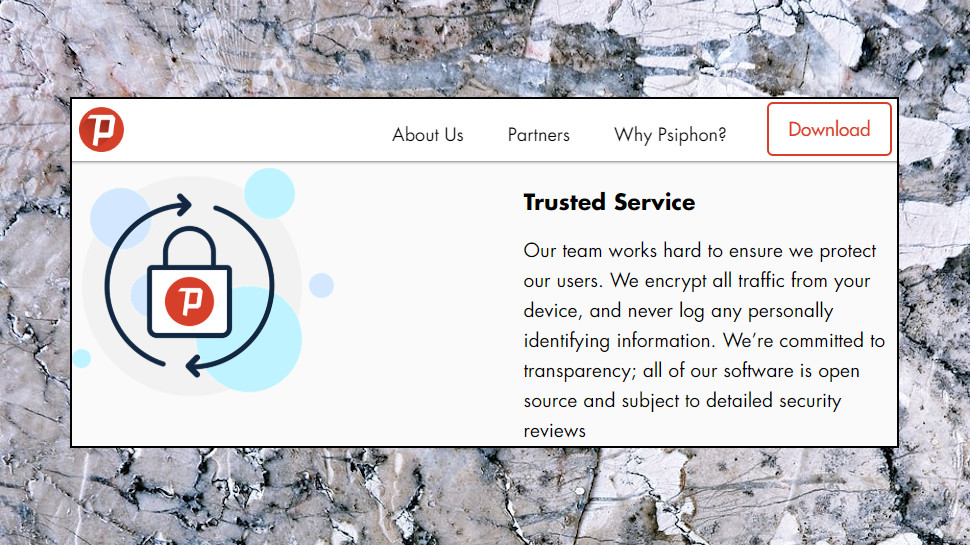
It’s also important to state that this is not a no-logs browser service. While Psiphon doesn’t collect browsing activity, it does collect and retain metadata related to the service, including connection times, device information, and bandwidth usage.
In some cases, this includes the domain visited. Psiphon also uses AWS in part to support its infrastructure, which creates a serious problem from a privacy point of view, as Amazon will log every IP that uses its services.
That’s somewhat worrying, considering Psiphon operates from Canada, which is a Five Eyes surveillance alliance member. In the event law enforcement from this jurisdiction comes knocking on Psiphon’s doors, it’s quite likely they’d be obliged to hand over a significant amount of data, which could correlate your activities from elsewhere on the internet.
That said, the most alarming privacy issue we’ve come across is a DNS leak in Psiphon’s VPN service. Psiphon claims it has taken particular care when choosing the DNS servers the app can connect to, ensuring they’re all picked from a vetted whitelist.
Unfortunately, we found that we could see our home IP address even with Psiphon active while using a DNS leak tool. We recognise that Psiphon isn’t built as a privacy tool, but DNS leaks simply aren’t acceptable when you’re offering VPN functionality.
On the plus side, Psiphon has undergone several independent security audits by reputable firms, including iSEC Partners, 7A Security, and, most recently, Cure53 in 2019. These audits found several flaws in Psiphon’s core VPN technology, all of which have since been fixed. Apart from the weaknesses identified, each audit has suggested that overall, Psiphon is quite secure.
Privacy and security score: 4/10
Track record
Since its 2006 inception at the University of Toronto's Citizen Lab, Psiphon has built a reputation specifically within the internet freedom community rather than the broader VPN market.
For example, during the 2021 Myanmar protests, Psiphon's user base surged from approximately 5,000 to 1.6 million monthly users, reflecting previous usage spikes after internet blackouts in Belarus and Azerbaijan. Clearly, in areas where internet freedom is on the line, Psiphon works.
That’s one reason you’ll have heard about it less than some of the big-name VPN providers. Psiphon is first and foremost a censorship bypass tool, rather than an all-in-one VPN. However, you also won’t have heard about it because there’s little to be said against Psiphon’s track record.
It hasn’t suffered any major security breaches, and the app has a completely clean rating when run through the CVE list, indicating that researchers in the wild haven’t found exploits for the app. That’s pretty impressive, considering Psiphon has been running for close to a decade and a half.
Track record score: 8/10
Customer support
Psiphon offers pretty minimal customer support. While there is a basic FAQ section on the website, it’s not easily accessible, and the dated nature of some of the questions suggests that it hasn’t been updated in a while.
There is no live chat or phone support, so if you’ve got an issue, you’ll need to send out an email request and hope someone gets back to you. One thing we did like is that Psiphon runs an email service that will send you back a bunch of country-specific links to download the app if your access to the main site is blocked.
It is somewhat odd, given Psiphon’s position as a VPN for users in restrictive countries, that there are no community forums and practically no useful user guides to help with installation.
Don’t expect extensive customer support from Psiphon. If you need a VPN that walks you through the setup process and keeps 24/7 customer support on hand, you’re better off investing in a premium VPN like ExpressVPN instead.
Customer support score: 3/10
Pricing and plans
Psiphon operates on a freemium model with the core service available at no cost. The free version includes unlimited data usage but caps speeds at 2 Mbps and includes advertisements whenever you boot up the VPN. Simple enough. What isn’t simple is Psiphon’s paid plan.
You can pay for Psiphon in two ways. On mobile, Psiphon can handle payment subscriptions through the app store. These are pretty self-explanatory: $2.99 per week, $10 per month, or $72 per year. These subscriptions remove advertisements and increase speed limits, although the performance you’ll get is significantly below the standard set by other premium VPN.
There’s also the PsiCash system, which we’re not a huge fan of. Instead of buying a subscription, PsiCash allows you to activate an on-demand boost to your VPN speeds. You have to purchase an amount of PsiCash, which is then credited to your account. You can then spend the PsiCash on temporary speed boosts for 1 hour, 1 day, 1 week, or 1 month.
The cost is significantly higher than just buying a subscription and requires you to create a separate PsiCash account to manage your funds, but it’s the only way to access the speed boost on Windows. PsiCash is somewhat unique in that you can also earn credits by watching ads, but we haven’t investigated this at length.
Pricing and plans score: 5/10
Should you use Psiphon?
It’s very difficult to recommend Psiphon as a generic VPN solution. It’s clearly built for a specific need, and it’s hard to say that Psiphon’s useless when it could be the lifeline for someone in a heavily censored country.
It’s been built to be super simple to download and deploy without any payment necessary, so we can see some use cases where it’d work. For example, if you're an activist journalist and need access to news and communication platforms at a moment’s notice, Psiphon may also be right for you.
Otherwise, there are a few serious things wrong here. The speeds are subpar for anything other than browsing the internet, there are several outstanding questions about both technical privacy and the privacy policy, and the payment scheme is confusing, to say the least.
If you need free VPN functionality, you should consider alternatives like Windscribe Free or ProtonVPN's free tier instead. Both of these providers offer better security practices and improved speeds.
Overall score: 43/100
Psiphon alternatives
1. NordVPN – from $3.39 per month
The best VPN overall
When privacy matters most, NordVPN delivers comprehensive protection with over 7,200 servers across 118 countries. The VPN app features an advanced Threat Protection engine that blocks malware and trackers both on your device and on your connection. Lightning-fast NordLynx protocol ensures smooth streaming and browsing on up to 10 devices simultaneously. At $3.39/month (2-year plan), you get premium security without compromise. Every plan includes a full 30-day money-back guarantee.
2. Surfshark – from $1.99 per month
The best cheap VPN
Break free from device limits with Surfshark's unlimited simultaneous connections, which are perfect for large households. Their 3,200+ servers across 100+ countries provide consistent access to global content. For security, CleanWeb technology blocks ads and malware automatically. Unique features like GPS spoofing and dynamic multi-hop routing make it a standout for privacy. Exceptional value at just $1.99/month (2-year plan) with a risk-free 30-day money-back guarantee.
3. ExpressVPN – from $4.99 per month
The best VPN for beginners
Experience VPN excellence with ExpressVPN's blazing-fast Lightway protocol and TrustedServer technology that runs entirely in RAM. With over 3,000+ servers to pick from in 105 countries, ExpressVPN offers high-speed connections nearly anywhere on the planet while quantum-resistant encryption keeps your data safe from prying eyes. User-friendly apps work flawlessly across all devices, backed by 24/7 expert support. Premium quality comes at $4.99/month (2-year plan) with a comprehensive 30-day money-back guarantee.

Sam Dawson is a cybersecurity expert who has over four years of experience reviewing security-related software products. He focuses his writing on VPNs and security, previously writing for ProPrivacy before freelancing for Future PLC's brands, including TechRadar. Between running a penetration testing company and finishing a PhD focusing on speculative execution attacks at the University of Kent, he still somehow finds the time to keep an eye on how technology is impacting current affairs.
You must confirm your public display name before commenting
Please logout and then login again, you will then be prompted to enter your display name.
